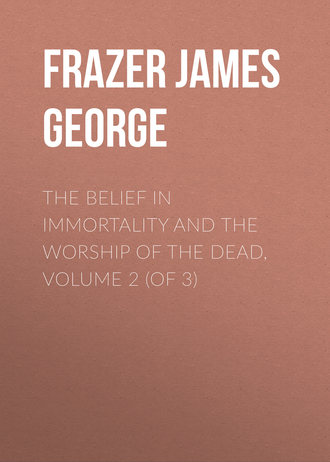 полная версия
полная версияThe Belief in Immortality and the Worship of the Dead, Volume 2 (of 3)
As our subject is the belief in immortality and the worship of the dead, we are not directly concerned with the original Tongan deities who were believed never to have been men. But since their functions and worship appear to have been in certain respects closely analogous to those of the inferior deities, the souls of the dead, some notice of them may not be out of place, if it helps to a fuller understanding of what we may call the human gods. Besides, we must always bear in mind that some at least of the so-called original gods may have been men, whose history and humanity had been forgotten. We can hardly doubt that the celestial hierarchy has often been recruited by the souls of the dead.
The original and superior gods, Mariner tells us, were thought to be rather numerous, perhaps about three hundred all told; but the names of very few of them were known, and even those few were familiar only to some of the chiefs and their ministers, the matabooles; "for it may easily be supposed," says Mariner, "that, where no written records are kept, only those (gods) whose attributes particularly concern the affairs of this world should be much talked of; as to the rest, they are, for the most part, merely tutelar gods to particular private families, and having nothing in their history at all interesting, are scarcely known to anybody else."181
Among these original and superior deities was Tali-y-Toobo, the patron god of the civil king and his family. He was the god of war and was consequently always invoked in time of war by the king's family; in time of peace prayers were sometimes offered to him for the general good of the nation as well as for the particular interest and welfare of the royal house. He had no priest, unless it was the king himself, who was occasionally inspired by him; but sometimes a whole reign would pass without the king being once favoured with the divine afflatus.182
Another god was Tooi fooa Bolotoo, whose name means "Chief of all Bolotoo." From this it might be supposed that he was the greatest god in Bolotoo, the home of the gods and of the deified spirits of men; but in fact he was regarded as inferior to the war god, and the natives could give no explanation of his high-sounding title. He was the god of rank in society, and as such he was often invoked by the heads of great families on occasion of sickness or other trouble. He had several priests, whom he occasionally inspired.183
Another great god was Toobo Toty, whose name signifies "Toobo the mariner." He was the god of voyages, and in that capacity was invoked by chiefs or anybody else at sea; for his principal function was to preserve canoes from accidents. Without being himself the god of wind, he had great influence with that deity, and was thus enabled no doubt to save many who were in peril on the great deep.184
Another god was Alo Alo, whose name means "to fan." He was the god of wind and weather, rain, harvest, and vegetation in general. When the weather was seasonable, he was usually invoked about once a month to induce him to keep on his good behaviour; but when the weather was unseasonable, or the islands were swept by destructive storms of wind and rain, the prayers to him were repeated daily. But he was not supposed to wield the thunder and lightning, "of which, indeed," says Mariner, "there is no god acknowledged among them, as this phenomenon is never recollected to have done any mischief of consequence."185 From this it would appear that where no harm was done, the Tongans found it needless to suppose the existence of a deity; they discovered the hand of a god only in the working of evil; fear was the mainspring of their religion. In boisterous weather at sea Alo Alo was not invoked; he had then to make room for the superior god, Toobo Toty, the protector of canoes, who with other sea gods always received the homage of storm-tossed mariners. However, Alo Alo, the weather god, came to his own when the yams were approaching maturity in the early part of November. For then offerings of yams, coco-nuts, and other vegetable products were offered to him in particular, as well as to all the other gods in general, for the purpose of ensuring a continuation of favourable weather and consequent fertility. The offering was accompanied by prayers to Alo Alo and the other gods, beseeching them to extend their bounty and make the land fruitful. Wrestling and boxing matches formed part of the ceremony, which was repeated eight times at intervals of ten days. The time for the rite was fixed by the priest of Alo Alo, and a curious feature of the ceremony was the presence of a girl of noble family, some seven or eight years old, who represented the wife of Alo Alo and resided in his consecrated house during the eighty days that the festal season lasted.186
Another god named Móooi was believed to support the earth on his prostrate body. In person he was bigger than any other of the gods; but he never inspired anybody, and had no house dedicated to his service. Indeed, it was supposed that this Atlas of the Pacific never budged from his painful and burdensome post beneath the earth. Only when he felt more than usually uneasy, he tried to turn himself about under his heavy load; and the movement was felt as an earthquake by the Tongans, who endeavoured to make him lie still by shouting and beating the ground with sticks.187 Similar attempts to stop an earthquake are common in many parts of the world.188
Tangaloa was the god of artificers and the arts. He had several priests, who in Mariner's time were all carpenters. It was he who was said to have brought up the Tonga islands from the bottom of the sea at the end of his fishing line;189 though in some accounts of Tongan tradition this feat is attributed to Maui.190 The very hook on which he hauled up the islands was said to be preserved in Tonga down to about thirty years before Mariner's time. It was in the possession of the divine chief Tooitonga; but unfortunately, his house catching fire, the basket in which the precious hook was kept perished with its contents in the flames. When Mariner asked Tooitonga what sort of hook it was, the chief told him that it was made of tortoise-shell, strengthened with a piece of whalebone, and that it measured six or seven inches from the curve to the point where the line was attached, and an inch and a half between the barb and the stem. Mariner objected that such a hook could hardly have been strong enough to support the whole weight of the Tonga islands; but the chief replied that it was a god's hook and therefore could not break. The hole in the rock in which the divine hook caught on the memorable occasion was shown down to Mariner's time in the island of Hoonga. It was an aperture about two feet square.191
§ 5. The Temples of the Gods
Some of the primitive gods had houses dedicated to them. These sacred houses or temples, as we may call them, were built in the style of ordinary dwellings; but generally more than ordinary care was taken both in constructing them and in keeping them in good order, decorating their enclosures with flowers, and so on. About twenty of the gods had houses thus consecrated to them; some of them had five or six houses, some only one or two. For example, Tali-y-Toobo, the patron god of the royal family, had four houses dedicated to him in the island of Vavau, two in the island of Lefooga (Lifuka), and two or three others of smaller importance elsewhere.192 Another patron god of the royal family, called Alai Valoo, had a large consecrated enclosure in the island of Ofoo; he had also at least one priest and was very frequently consulted in behalf of sick persons.193
To desecrate any of these holy houses or enclosures was a most serious offence. When Mariner was in the islands it happened that two boys, who had belonged to the crew of his ship, were detected in the act of stealing a bale of bark-cloth from a consecrated house. If they had been natives, they would instantly have been punished with death; but the chiefs, taking into consideration the youth and inexperience of the offenders, who were foreigners and ignorant of native customs, decided that for that time the crime might be overlooked. Nevertheless, to appease the anger of the god, to whom the house was consecrated, it was deemed necessary to address him humbly on the subject. Accordingly his priest, followed by chiefs and their ministers (matabooles), all dressed in mats with leaves of the ifi tree194 round their necks in token of humility and sorrow, went in solemn procession to the house; they sat down before it, and the priest addressed the divinity to the following purport: "Here you see the chiefs and matabooles that have come to thee, hoping that thou wilt be merciful: the boys are young, and being foreigners, are not so well acquainted with our customs, and did not reflect upon the greatness of the crime: we pray thee, therefore, not to punish the people for the sins of these thoughtless youths: we have spared them, and hope that thou wilt be merciful and spare us." The priest then rose up, and they all retired in the same way they had come. The chiefs, and particularly the king, severely reprimanded the boys, endeavouring to impress on their minds the enormity of their offence, and assuring them that they owed their lives only to their presumed ignorance of the heinousness of the crime.195
Another case of sacrilege, which occurred in Mariner's time, was attended with more tragic consequences. He tells us that consecrated places might not be the scene of war, and that it would be highly sacrilegious to attack an enemy or to spill his blood within their confines. On one occasion, while Mariner was in the islands, four men, pursued by their enemies, fled for refuge to a consecrated enclosure, where they would have been perfectly safe. One of them was in the act of scrambling over the reed fence, and had got a leg over it, when he was overtaken by a foe, who struck him such a furious blow on the head that he fell dead within the hallowed ground. Conscience-stricken, the slayer fled to his canoe, followed by his men; and on arriving at the fortress where the king was stationed he made a clean breast of his crime, alleging in excuse that it had been committed in hot blood when he had lost all self-command. The king immediately ordered kava to be taken to the priest of his own tutelary god, that the divinity might be consulted as to what atonement was proper to be made for so heinous a sacrilege. Under the double inspiration of kava and the deity, the priest made answer that it was necessary a child should be strangled to appease the anger of the gods. The chiefs then held a consultation and determined to sacrifice the child of a high chief named Toobo Toa. The child was about two years old and had been born to him by a female attendant. On such occasions the child of a male chief by a female attendant was always chosen for the victim first, because, as a child of a chief, he was a worthier victim, and second, because, as a child of a female attendant, he was not himself a chief; for nobility being traced in the female line only those children were reckoned chiefs whose mothers were chieftainesses; the rank of the father, whether noble or not, did not affect the rank of his offspring. On this occasion the father of the child was present at the consultation and consented to the sacrifice. The mother, fearing the decision, had concealed the child, but it was found by one of the searchers, who took it up in his arms, while it smiled with delight at being noticed. The mother tried to follow but was held back; and on hearing her voice the child began to cry. But on reaching the place of execution it was pleased and delighted with the bandage that was put round its neck to strangle it, and looking up in the face of the executioner it smiled again. "Such a sight," we are told, "inspired pity in the breast of every one: but veneration and fear of the gods was a sentiment superior to every other, and its destroyer could not help exclaiming, as he put on the fatal bandage, O iaaoé chi vale! (poor little innocent!)." Two men then tightened the cord by pulling at each end, and the struggles of the innocent victim were soon over. The little body was next placed upon a sort of hand-barrow, supported on the shoulders of four men, and carried in a procession of priests, chiefs, and matabooles, all clothed as suppliants in mats and with wreaths of green leaves round their necks. In this way it was conveyed to various houses dedicated to different gods, before each of which it was placed on the ground, all the company sitting behind it, except one priest, who sat beside it and prayed aloud to the god that he would be pleased to accept of this sacrifice as an atonement for the heinous sacrilege committed, and that punishment might accordingly be withheld from the people. When this had been done before all the consecrated houses in the fortress, the body was given up to its relations, to be buried in the usual manner.196
The consecration of a house or a piece of ground to a god was denoted by the native word taboo, the general meaning of which was prohibited or forbidden.197 It was firmly believed by the Tongans in former days that if a man committed sacrilege or broke a taboo, his liver or some other of his internal organs was liable to become enlarged and scirrhous, that is, indurated or knotty; hence they often opened dead bodies out of curiosity, to see whether the deceased had been sacrilegious in their lifetime. As the Tongans are particularly subject to scirrhous tumours, it seems probable that many innocent persons were thus posthumously accused of sacrilege on the strength of a post-mortem examination into the state of their livers.198 Another disagreeable consequence of breaking a taboo was a peculiar liability to be bitten by sharks, which thus might be said to act as ministers of justice. As theft was included under the general head of breach of taboo, a simple way of bringing the crime home to the thief in case of doubt was to cause the accused to go into the water where sharks were known to swarm; if they bit him, he was guilty; if they did not, he was innocent.199
§ 6. Priests and their Inspiration
Priests were known by the title of fahe-gehe, a term which means "split off," "separate," or "distinct from," and was applied to a man who has a peculiar sort of mind or soul, different from that of ordinary men, which disposed some god occasionally to inspire him. Such inspirations frequently happened, and when the fit was on him the priest had the same reverence shown to him as if he were the god himself; at these times even the king would retire to a respectful distance and sit down among the rest of the spectators, because a god was believed to exist at that moment in the priest and to speak from his mouth. But at other times a priest had no other respect paid to him than was due to him for his private rank in society. Priests generally belonged to the lower order of chiefs or to their ministers, the matabooles; but sometimes great chiefs were thus visited by the gods, and the king himself has been inspired by Tali-y-Toobo, the chief of the gods.200 The profession of priest was generally hereditary, the eldest son of a priest becoming, on his father's death, a priest of the same god who had inspired his deceased parent. In their uninspired moments the priests lived indiscriminately with the rest of the people and were treated with no special deference.201
The ceremony of inspiration, during which the priest was believed to be possessed by a god and to speak in his name, was regularly accompanied or preceded by a feast, at which the drinking of kava formed the principal feature. The priest himself presided at the feast and the people gathered in a circle round him; or, to be more exact, the people formed an ellipse, of which the priest occupied the place of honour at one of the narrow ends; while opposite him, at the other extremity of the ellipse, sat the man who was charged with the important duty of brewing the kava. At such sessions the chiefs sat indiscriminately among the people on account of the sacredness of the occasion, conceiving that such humble demeanour must be acceptable to the gods. The actual process of inspiration was often witnessed by Mariner, and is described by him in his own words as follows:
"As soon as they are all seated, the priest is considered as inspired, the god being supposed to exist within him from that moment. He remains for a considerable time in silence, with his hands clasped before him; his eyes are cast down, and he rests perfectly still. During the time that the victuals are being shared out, and the cava preparing, the matabooles sometimes begin to consult him; sometimes he answers them, at other times not; in either case he remains with his eyes cast down. Frequently he will not utter a word till the repast is finished, and the cava too. When he speaks, he generally begins in a low and very altered tone of voice, which gradually rises to nearly its natural pitch, though sometimes a little above it. All that he says is supposed to be the declaration of the god, and he accordingly speaks in the first person as if he were the god. All this is done generally without any apparent inward emotion or outward agitation; but on some occasions his countenance becomes fierce, and, as it were, inflamed, and his whole frame agitated with inward feeling; he is seized with an universal trembling; the perspiration breaks out on his forehead, and his lips, turning black, are convulsed; at length, tears start in floods from his eyes, his breast heaves with great emotion, and his utterance is choked. These symptoms gradually subside. Before this paroxysm comes on, and after it is over, he often eats as much as four hungry men, under other circumstances, could devour. The fit being now gone off, he remains for some time calm, and then takes up a club that is placed by him for the purpose, turns it over and regards it attentively; he then looks up earnestly, now to the right, now to the left, and now again at the club; afterwards he looks up again, and about him in like manner, and then again fixes his eyes upon his club, and so on, for several times: at length he suddenly raises the club, and, after a moment's pause, strikes the ground, or the adjacent part of the house, with considerable force: immediately the god leaves him, and he rises up and retires to the back of the ring among the people."202
§ 7. The Worship of the Gods, Prayers, and Sacrifices
The worship offered to the gods consisted as usual of prayers and sacrifices. Prayers were put up to them, sometimes in the fields, and sometimes at their consecrated houses. On ordinary occasions a simple offering consisted of a small piece of kava root deposited before a god's house.203 But in the great emergencies of life the favour of the gods was sued with more precious offerings. When the younger daughter of Finow, a girl of six or seven years, was sick to death, the dying princess was carried from her father's house into the sacred enclosure of Tali-y-Toobo, the patron god of the kings, and there she remained for a fortnight. Almost every morning a hog was killed, dressed, and presented before the god's house to induce him to spare the life of the princess. At the same time prayers were addressed to the deity for the recovery of the patient; but as this particular god had no priest, the prayers were offered by a minister (mataboole), sometimes by two or three in succession, and they were repeated five, six, or seven times a day. Their general purport was as follows: "Here thou seest assembled Finow and his chiefs, and the principal ministers (matabooles) of thy favoured land; thou seest them humbled before thee. We pray thee not to be merciless, but to spare the life of the woman for the sake of her father, who has always been attentive to every religious ceremony. But if thy anger is justly excited by some crime or misdemeanour committed by any other of us who are here assembled, we entreat thee to inflict on the guilty one the punishment which he merits, and not to let loose thy vengeance on one who was born but as yesterday. For our own parts, why do we wish to live but for the sake of Finow? But if his family is afflicted, we are all afflicted, innocent as well as guilty. How canst thou be merciless? Have regard for Finow and spare the life of his daughter." When despite of prayers and the sacrifices of pigs, the girl grew daily worse instead of better, she was removed to many other consecrated enclosures of other gods, one after the other, where the like fond prayers and fruitless offerings were presented in the vain hope of staving off the approach of death.204
But more precious sacrifices than the blood of hogs were often laid at the feet of the angry gods. When a relation of a superior rank was ill, it was a very common practice for one or more of his or her inferior kinsfolk to have a little finger, or a joint of a finger, cut off as a sacrifice to induce the offended deity to spare the sick man or woman. So common was the custom in the old days that there was scarcely a person living in the Tonga islands who had not thus lost one or both of his little fingers, or a considerable portion of both. It does not appear that the operation was very painful. Mariner witnessed more than once little children quarrelling for the honour of having it performed on them. The finger was laid flat upon a block of wood: a knife, axe, or sharp stone was placed with the edge on the joint to be severed, and a powerful blow with a hammer or heavy stone effected the amputation. Sometimes an affectionate relative would perform the operation on his or her own hand. John Williams questioned a girl of eighteen who had hacked off her own little finger with a sharp shell to induce the gods to spare her sick mother. Generally a joint was taken off at a time; but some persons had smaller portions amputated to admit of the operation being often repeated in case they had many superior relations, who might be sick and require the sacrifice. When they had no more joints which they could conveniently spare, they rubbed the stumps of the mutilated fingers till the blood streamed from the wounds; then they would hold up the bleeding hands in hope of softening the heart of the angry god.205 Captain Cook understood that the operation was performed for the benefit of the sufferers themselves to heal them in sickness,206 and the same view was apparently taken by the French navigator Labillardière,207 but in this they were probably mistaken; neither of them had an accurate knowledge of the language, and they may easily have misunderstood their informants. Perhaps the only person in the islands who was exempt from the necessity of occasionally submitting to the painful sacrifice was the divine chief Tooitonga, who, as he ranked above everybody, even above the king, could have no superior relation for whom to amputate a finger-joint. Certainly we know that Tooitonga had not, like the rest of his countrymen, to undergo the painful operations of tattooing and circumcision; if he desired to be tattooed or circumcised, he was obliged to go to other islands, particularly to Samoa, for the purpose.208 Perhaps, though this is not mentioned by our authorities, it would have been deemed impious to shed his sacred blood in his native land.
But sacrifices to the gods for the recovery of the sick were not limited to the amputation of finger-joints. Not uncommonly children were strangled for this purpose.209 Thus when Finow the king was grievously sick and seemed likely to die, the prince, his son, and a young chief went out to procure one of the king's own children by a female attendant to sacrifice it as a vicarious offering to the gods, that their anger might be appeased and the health of its father restored. They found the child sleeping in its mother's lap in a neighbouring house; they took it away by force, and retiring with it behind an adjacent burial-ground (fytoca) they strangled it with a band of bark-cloth. Then they carried it before two consecrated houses and a grave, at each place gabbling a short but appropriate prayer to the god, that he would intercede with the other gods in behalf of the dying king, and would accept of this sacrifice as an atonement for the sick man's crimes.210 When, not long afterwards, the divine chief Tooitonga, in spite of his divinity, fell sick and seemed like to die, one or other of his young relations had a little finger cut off every day, as a propitiatory offering to the gods for the sins of the saintly sufferer. But these sacrifices remaining fruitless, recourse was had to greater. Three or four children were strangled at different times, and prayers were offered up by the priests at the consecrated houses and burial-grounds (fytocas) but all in vain. The gods remained deaf to the prayers of the priests; their hearts were not touched by the cutting off of fingers or the strangling of children; and the illness of the sacred chief grew every day more alarming. As a last resort and desperate remedy, the emaciated body of the dying man was carried into the kitchen, the people imagining that such an act of humility, performed on behalf of the highest dignitary of the Tonga islands, would surely move the deities to compassion and induce them to spare a life so precious to his subjects.211 The same curious remedy had shortly before been resorted to for the benefit of the dying or dead king, Finow the First: his body was carried into the kitchen of the sacred chief, the Tooitonga, and there placed over the hole in the ground where the fire was lighted to cook victuals: "this was thought to be acceptable to the gods, as being a mark of extreme humiliation, that the great chief of all the Hapai islands and Vavaoo, should be laid where the meanest class of mankind, the cooks, were accustomed to operate."212








